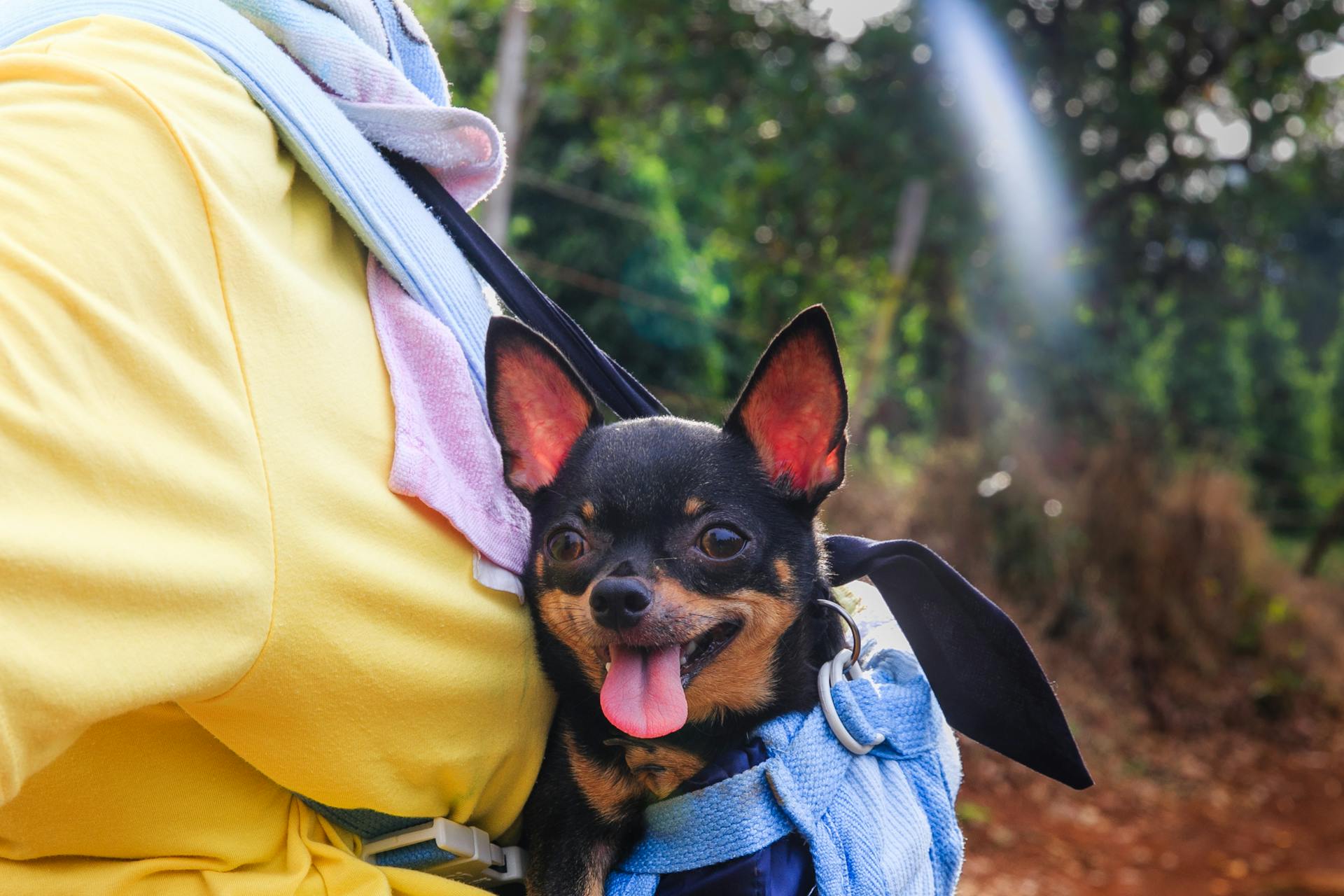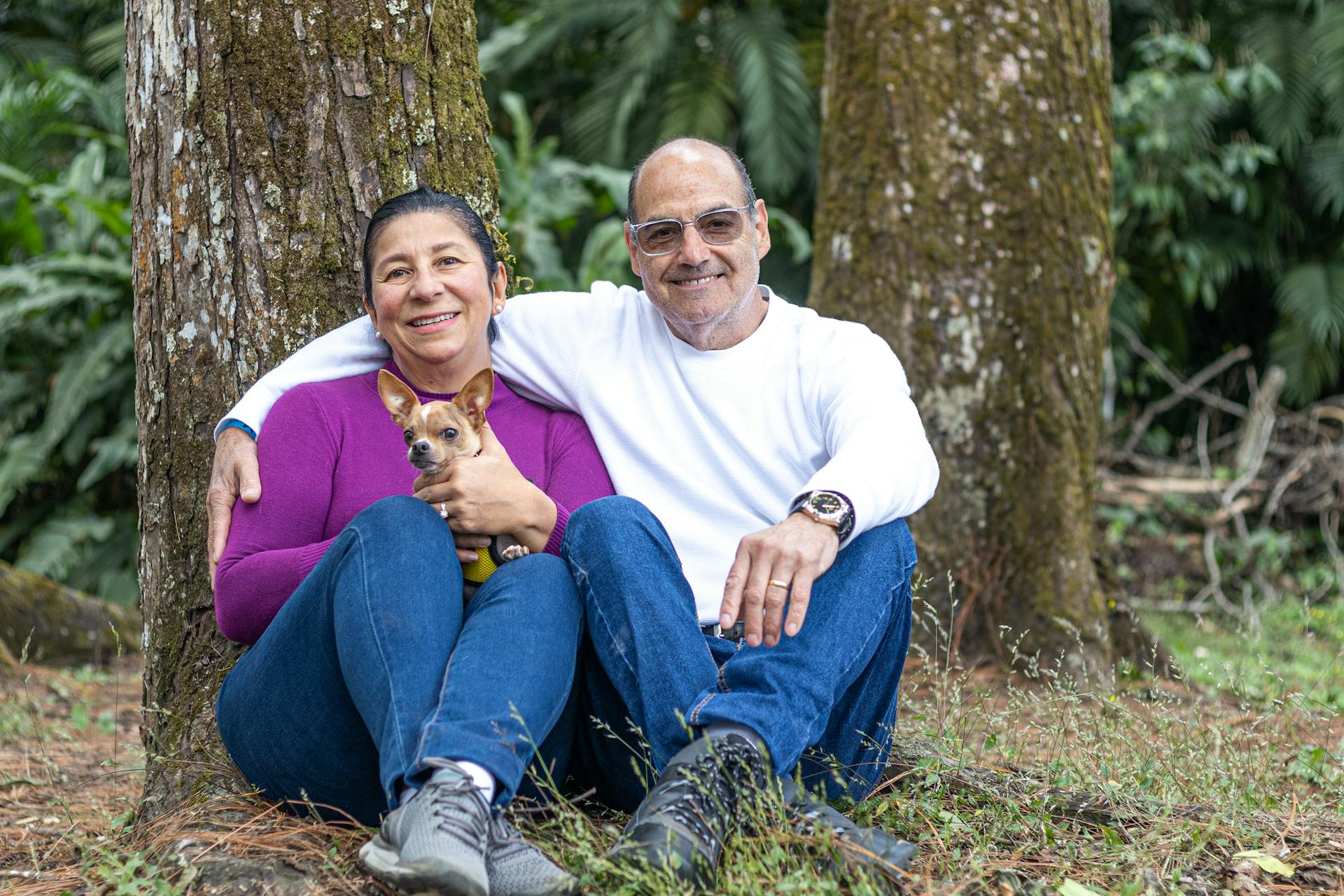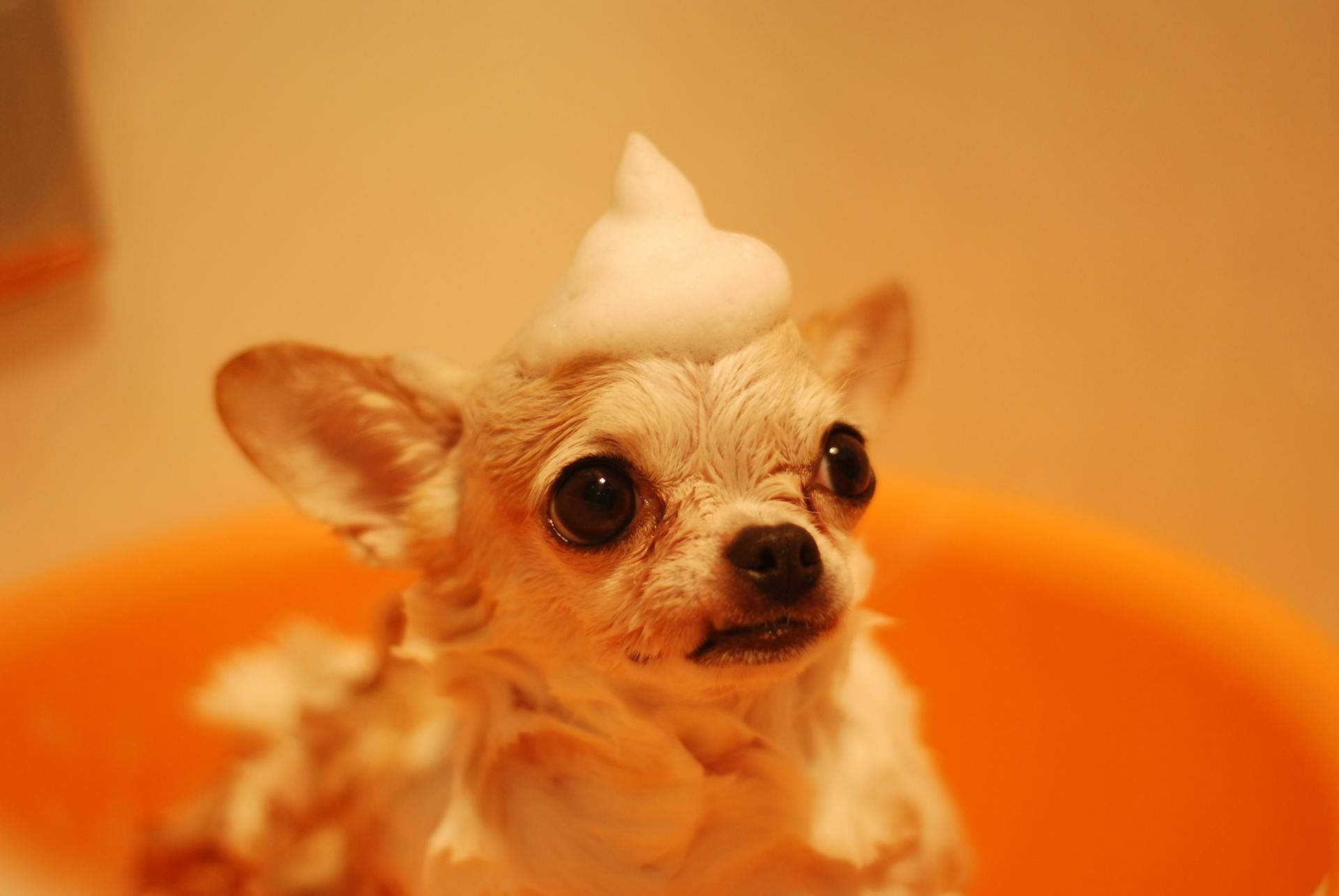
As your beloved Chihuahua ages, it's essential to provide them with the right care and support to ensure they live their golden years comfortably.
Old Chihuahuas require regular veterinary check-ups to monitor their health and catch any potential issues early.
At around 10-15 years old, Chihuahuas may start to show signs of age-related health issues, such as kidney disease, arthritis, and vision loss.
Their small size may make it difficult for them to get up from a lying down position, so it's crucial to provide ramps or stairs to help them move around safely.
With proper care and attention, many old Chihuahuas can live up to 18 years or more, enjoying a happy and healthy life.
Worth a look: Teacup Chihuahua Care
Breed History and Basics
The Chihuahua breed has a rich history that dates back to ancient times. The Mexican state of Chihuahua is generally regarded as their native land, but some believe they may have originated from Malta or even China.
In the 11th Century, the Aztecs conquered the Toltec people, and the dogs became more than just a source of food. They started to feature in religious traditions and were bred for companionship.
The breed we know today is a result of breeding the Techichi with the Xoloitzcuintli (Mexican Hairless Dog) to produce a dog with more refined features. This breeding process gained popularity as a companion for nobility.
Unlike most breeds, the Chihuahua was not bred for a specific role other than companionship, which is a vital part of understanding their nature. Historians believe some people sacrificed Chihuahuas to accompany the bodies of deceased nobles to guide them through the afterlife.
If this caught your attention, see: Why Do People like Chihuahuas
Care and Maintenance
Keep your elderly Chihuahua stress-free by keeping small children and other pets away. This will help prevent anxiety and stress that can exacerbate age-related issues.
Regular grooming is essential for your old Chihuahua's health and comfort. Regular brushing prevents matting, and nail trimming avoids discomfort.
Here are some essential grooming tasks to include in your daily routine:
- Brush your Chihuahua daily to prevent matting
- Trim their nails regularly to avoid discomfort
- Examine and wipe their eyes with an eye cleaner to prevent tear staining
- Get them used to having their toes played with from day one to make nail trims easier
Remember to keep a list of emergency contacts, including your vet and the nearest 24-hour veterinary clinic, handy in case of any unexpected issues.
Pet Compatibility
Chihuahuas like to be part of a pack and feel more secure when surrounded by other canines.
They can take over the leadership of a group of dogs due to their assertive nature and survival mechanism. It's common for the smallest dog in the house to assert dominance.
Care needs to be taken when introducing a Chihuahua to new dogs since they can be accidentally injured.
However, it's also essential to allow them to meet each other properly and establish boundaries. Large dogs can be surprisingly gentle once they learn how to treat their tiny friends.
Chihuahuas enjoy a game of chase, and cats that are likely to run away can become targets of relentless pursuit.
Trimming your cat's claws is a good idea as a precaution to keep those bulging Chihuahua eyes safe.
For your interest: When Are Chihuahuas Full Grown
Food Requirements
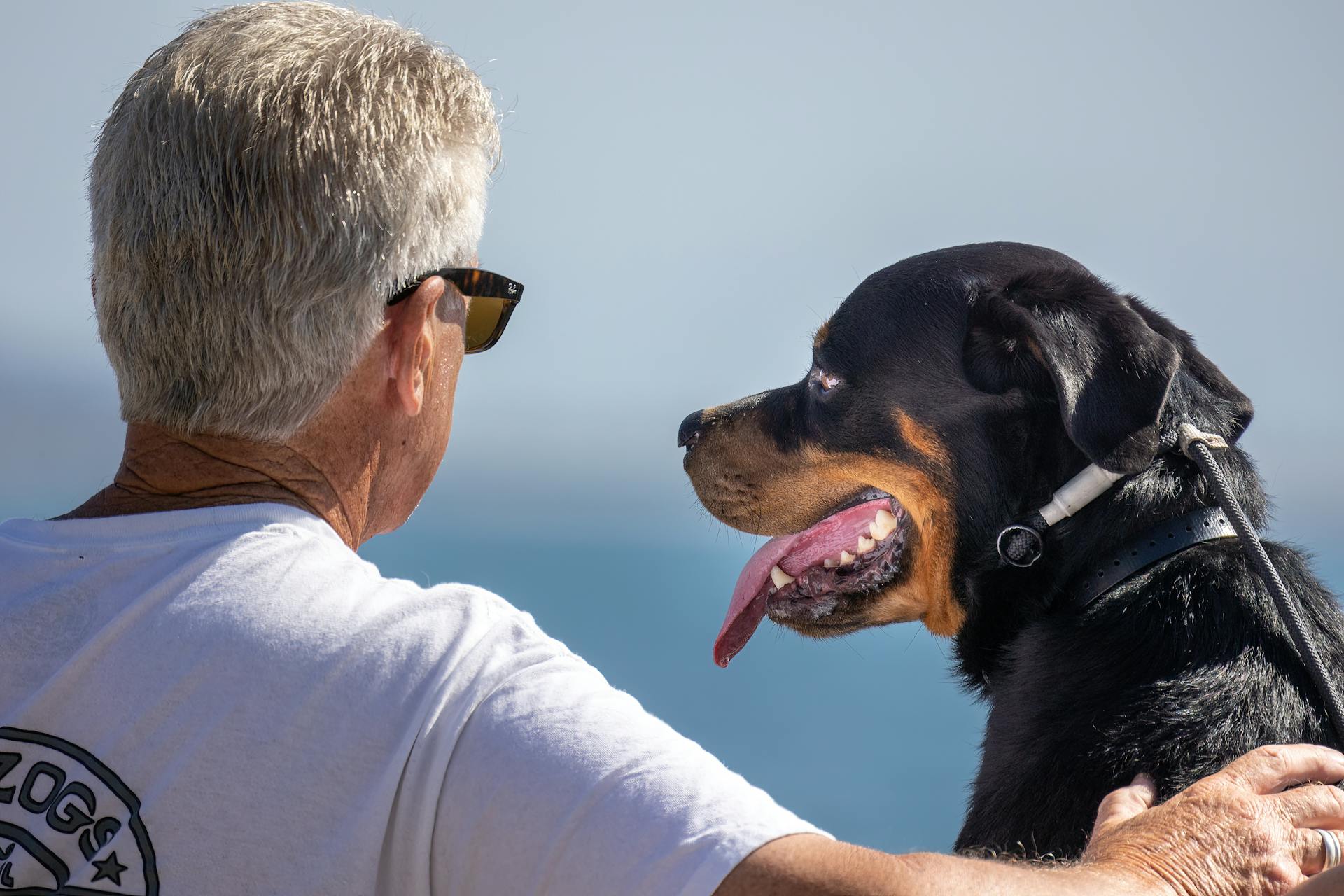
When it comes to feeding your Chihuahua, it's essential to remember that they have tiny stomachs and don't need much food. Most Chihuahuas only need to eat around half a cup of dry food or 6–10 ounces of wet food per day.
Some Chihuahuas can be picky eaters, while others are very greedy. Being so small, it's not uncommon for a Chihuahua to skip a meal here or there.
If you do offer them something extra tasty when they miss a meal, they'll remember your generosity and may expect it in the future. This can lead to some interesting eating habits, so be prepared to set boundaries.
Feeding them wet and dry food is okay, but it's best to find a brand with smaller pieces if you use dry food. This will make it easier for them to eat and digest.
Worth a look: When to Blanket an Old Horse?
Training
Training a Chihuahua requires attention to detail, especially considering their small stature can make training more challenging.
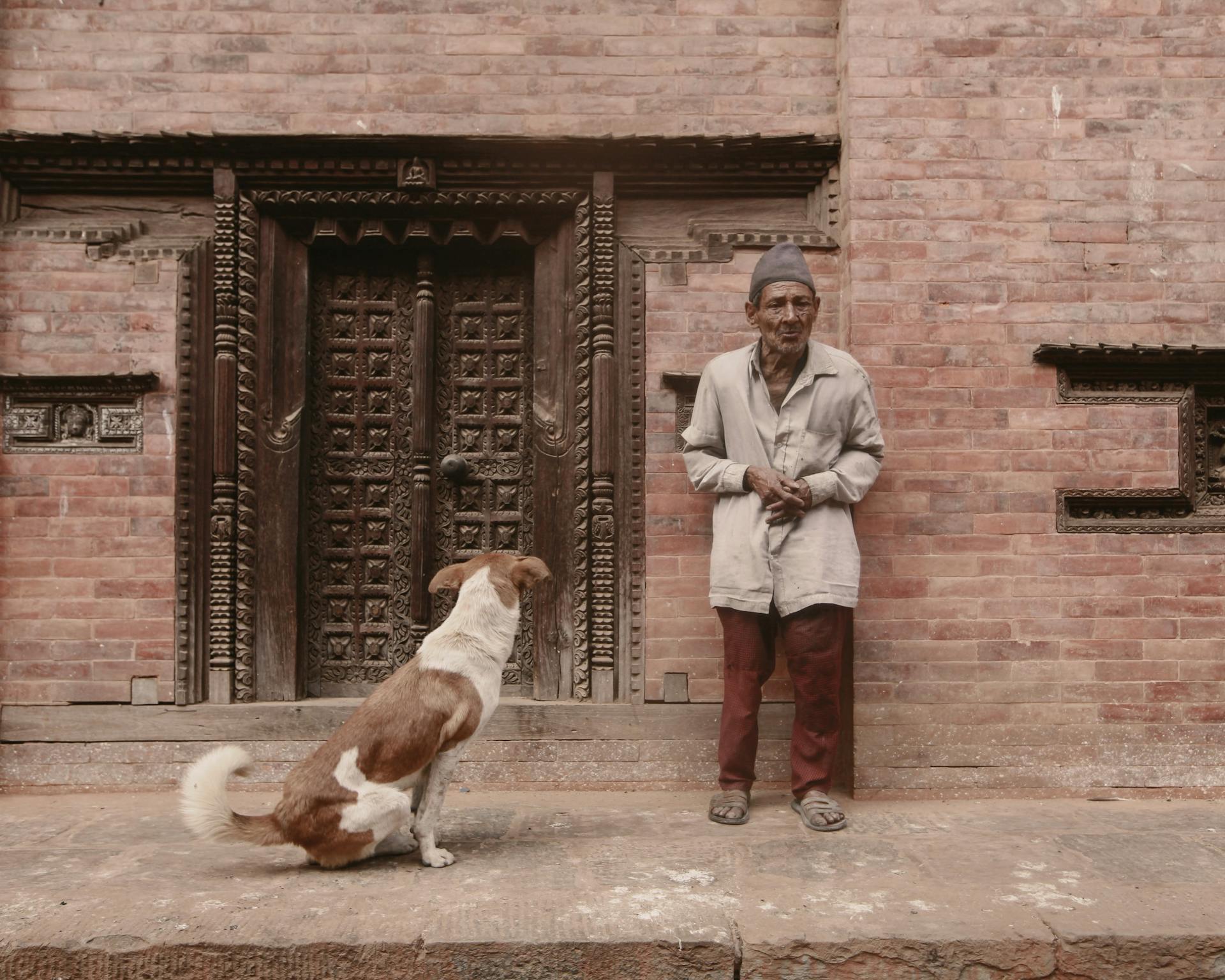
Chihuahuas have a unique personality, with some having three settings: eating, sleeping, and getting into mischief. They love to chew, bite, and play with things, so silence should always be treated with suspicion.
Indoor accidents can be easy to miss, so it's essential to keep an eye on your Chihuahua at all times to interrupt them before they go potty indoors.
Using a crate can be a useful tool for toilet training a Chihuahua, but it's crucial to use a fairly small crate. If the crate is too roomy, the dog may use one corner as a toilet.
A crate that's the size of their bed and includes space for a small water bowl is ideal for Chihuahuas.
Grooming
Grooming is an essential part of your Chihuahua's care and maintenance. Regular grooming not only keeps their coat looking great, but it also helps prevent health issues. A daily brushing is all that's needed for long-haired Chihuahuas, while short-haired ones require minimal grooming.
You can use a soft-bristle brush or grooming mitt to keep their coat clean and remove loose hair. Regular nail trims are also crucial to prevent discomfort. Chihuahuas are prone to tear staining, so it's a good idea to get them used to having their eyes examined and wiped with an eye cleaner as part of their daily routine.
Chihuahuas are moderate shedders, so expect some shedding throughout the year. However, their small size means that shedding is generally manageable. Regular tooth brushing with dog-specific toothpaste is ideal, and should be done at least twice daily.
Here are some grooming essentials to keep in mind:
- Soft-bristle brush or grooming mitt
- Nail clippers
- Eye cleaner and lubricating gel
- Dog-specific toothpaste
- Gentle dog shampoo
Health and Wellness
As your furry friend ages, it's essential to prioritize their health and wellness. Chihuahuas can live up to 12-14 years, but they're prone to certain health issues that can affect their quality of life.
Regular dental care is crucial to prevent dental disease, which can lead to painful periodontal disease. Brush your Chi's teeth a few times a week and consider dental treats to keep their teeth clean and healthy.
Intriguing read: Common Problems with Chihuahuas
Chihuahuas can also develop arthritis, joint issues like Luxating Patella, and heart conditions like congestive heart failure and an enlarged heart as they age. Monitor your senior Chi for signs of fatigue, weight gain or loss, and changes in appetite or water intake.
Here are some common health issues that can affect elderly Chihuahuas:
By staying on top of your senior Chi's health and addressing these issues early on, you can help them live a happy and comfortable life.
Fur Loss Treatment
If your Chihuahua is diagnosed with a condition that causes fur loss, the affected area will likely return to normal following the recommended treatment. In many cases, the hair will grow back on its own.
If a health condition is ruled out, you can try some at-home treatments to improve the quality of your Chihuahua's skin and fur. These treatments can be a great way to support your dog's overall health and well-being.
Take a look at this: Do Chihuahuas Have Hair or Fur
Genetic hair loss or alopecia is a common cause of fur loss in Chihuahuas, and in these cases, the hair may not grow back. However, seeking veterinary advice can help rule out more serious causes.
You can try using medicated shampoos or conditioners to help soothe and calm your Chihuahua's skin. These can be especially helpful if your dog is experiencing itching or irritation.
In some cases, fur loss can be a sign of a more serious underlying health issue. If your dog is also experiencing other symptoms such as itching, infection, or behavioral changes, it's essential to see a vet right away.
Curious to learn more? Check out: Silky Hair Terrier
Dental Duty
Dental Duty is a crucial aspect of your Chihuahua's health, and it's essential to prioritize it from an early age. Regular dental care can prevent painful periodontal disease, which is a common issue in Chihuahuas.
Chihuahuas can suffer from overcrowding and dental disease due to their small size and teeth arrangement. Brushing their teeth a few times a week and providing dental treats can help keep their teeth clean and healthy.
A fresh viewpoint: Do Chihuahuas Have Bad Teeth
Reverse sneezing can sometimes be triggered by dental issues, such as overcrowding or poor oral health. This is why regular dental care is vital in preventing reverse sneezing.
Here are some tips for maintaining your Chihuahua's dental health:
- Brush your Chi's teeth a few times a week
- Consider dental treats to help keep their teeth clean
- Regular professional cleaning can prevent painful periodontal disease
- Check for signs of dental disease, such as bad breath, yellow teeth, or red gums
If your Chihuahua loses their teeth, it's essential to adjust their diet and provide food that's easy to chew and swallow. Consider making food for your toothless dog or consulting with your vet for advice.
Frequently Asked Questions
What to expect from a 15 year old Chihuahua?
As a 15-year-old Chihuahua, you can expect gradual mental decline, including disorientation, forgetfulness of familiar faces and commands, and confusion about daily routines
Sources
- https://www.dogster.com/dog-breeds/chihuahua
- https://www.borrowmydoggy.com/doggypedia/dog-breed-guides-chihuahua
- https://fotp.com/learn/dog-health/chihuahua-hair-loss-why-it-happens-and-how-to-treat
- https://ilovemychi.com/caring-for-your-elderly-chihuahua/
- https://www.istockphoto.com/photos/old-chihuahua
Featured Images: pexels.com

